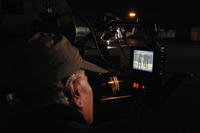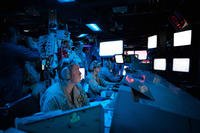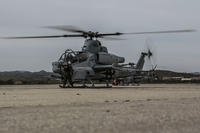About 350 of the expected 4,000 troops authorized to combat the Ebola epidemic have now arrived in West Africa more than two weeks after President Obama pledged that the U.S. would lead the international effort against the virus, the Pentagon said Monday.
More than 300 of the troops were in Liberia while the rest were in Senegal, which is projected to serve as a staging base for the movement of medical supplies and personnel into the region where Ebola has hit hardest in Liberia, Sierra Leone and Guinea.
The troops in Liberia, including Navy Seabees, were expected to have a small 25-bed facility for health care workers showing Ebola symptoms up and running by the middle of October, said Army Col. Steve Warren, a Pentagon spokesman. The 25-bed facility was on the outskirts of Roberts International Airport in Monrovia, the Liberian capital, Warren said.
The troops were expected to begin assembling the first 100-bed treatment center for Ebola victims on Oct. 28, and begin assembling a second unit on Nov. 1, Warren said.
The U.S. has committed to setting up 17 of the 100-bed treatment centers as part of an overall $750 million U.S. effort by the Defense Department, the U.S. Agency for International Development (AID) and the Centers for Disease Control CDC).
At a White House briefing late last Friday, AID Administrator Rajiv Shah said that AID and the CDC had stepped up their own efforts in the region from June through August "but the complexity of building out Ebola treatment units and providing the logistics support of protective equipment and medicines required the significant additional resources brought by DoD."
At the same White House briefing, Gen. David Rodriguez, head of the U.S. Africa Command, said it will take several weeks before the military begins making progress on the treatment centers and establishes a smoothly functioning logistics chain.
"We're working with the armed forces of Liberia," Rodriguez said. "We're working with contractors and we're working with a logistics chain of events to get the build materials there as fast as we can. It will take us several weeks to do that."
Rodriguez stressed that "right now we are not anticipating that military personnel will be treating the people." However, when asked whether the military had personnel capable of treating Ebola victims, Rodriguez said yes.
Over the weekend, two of the nation's top public health officials said that a swift response by the military to the Ebola epidemic was vital to containing the virus.
"The virus is spreading so fast, it's hard to keep up," Dr. Thomas Frieden, head of the CDC, said Sunday on the CNN "State of the Union Program."
The World Health Organization has reported that the number of Ebola patients in Guinea, Liberia and Sierra Leone has passed 7,500, with more than 3,450 deaths recorded, but the WHO itself and aid groups working in the region estimate that the number of cases is much higher.
"We really need to ramp up our efforts," said Frieden, who was joining other health care specialists in a White House meeting with President Obama Monday afternoon.
Dr. Anthony Fauci, direction of the National Institute of Infectious Diseases also called for speeding up the Ebola response and also dismissed the concerns of Sen. Rand Paul, R-Kentucky, that troops on a ship returning from West Africa might spread the disease in the U.S.
"I'm sorry, but that's really not a concern," Fauci said on the CBS' "Face the Nation" program. "First of all, the troops that are going over there are going to be fundamentally for logistic purposes -- command, control, engineering, setting up the hospitals. They're well trained. They will not be in direct risk in the sense of contact with individuals."
Fauci said "I don't, and the Army does not, have any real concern that those 3,000 to 4,000 are going to be in danger."
-- Richard Sisk can be reached at richard.sisk@monster.com





























